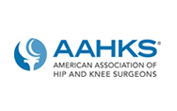Revision Total Hip Arthroplasty
Total Hip Surgery
A total hip replacement involves replacing all the worn out parts involving the ball (femoral head) and the socket (acetabulum) in the hip joint using a stem that fits into the thigh bone (femur) and a metal cup that fits into the socket. A thin piece of plastic (polyethylene) fits into the socket and ceramic head fits onto the metal stem in the femur bone. The surgery typically takes about is an hour to an hour and half. Patients often walk the same day as the surgery. The recovery from a hip replacement varies but is usually around 1 to 2 months.
The goal of a hip replacement is to restore function and eliminate most of the pain from hip arthritis. Candidates for a hip replacement include people who have hip arthritis, no longer get relief from their hip pain with non-operative treatments, and are significantly bothered by their hip pain. The patient, not the doctor, ultimately decides if their hip pain is significant enough to warrant a hip replacement. Living with the arthritis pain and continuing non-operative treatments are always an option.
Revision Hip Surgery
Replacing a previously implanted prosthesis is more difficult and less predictable than the first surgery. Each case has its own unique problems and risks. In all cases, the risks are much greater than the risks with the first surgery. The outcomes following revision surgery have greatly improved over the years, but the recovery is sometimes longer, and the results are less certain. Often times, special implants and bone graft material is necessary to rebuild the hip joint.
The major indications of a revision hip replacement are hip instability (dislocation), infection, component failure due to wear, and hip pain. If you are having problems with your existing hip replacement, please try to obtain your operative note and a copy of the implants used. This information will significantly help Dr. Duncan determine the cause and solution of the problem.
Pre-operative Joint Replacement Education Class
- Multiple studies have shown that pre-operative education improves patient’s outcomes after joint replacement surgery
- Our Hospital offers a free pre-operative instructional class
- I require that my patients attend this class.
-
During this class,
- You will meet with the nurses that will be taking care of you after your surgery
- Discuss what you can expect after surgery
- Talk about what you need to bring with you to the hospital
- Discuss whether you plan to go home with a home health
Medical Clearance
- If you have not seen your medical doctor recently, you should make an appointment with him/her as soon as possible. Your surgery can then be performed once your medical doctor clears you for it
- If you have recently seen your medical doctor, you should have him/her send a note to my office stating that you are medically fit for your surgery
- If there is a question as to whether you have seen your medical doctor recently enough, call your medical doctor and ask him or her
- If you see a medical specialist (e.g., a heart or lung doctor), have him/her also send a note to my office stating that you are medically fit for your surgery
- If you have no medical doctor and no medical problems, let me know during your clinic visit
- If you have no medical doctor and you do have medical problems, I will refer you to a medical doctor prior to any surgery
- You must inform my office immediately about any infection anywhere on your body, especially in the skin over your hip. This can include a pimple or scratch, or infection in your fingernails, toenails, teeth, or urine
- If you have any ongoing dental problems or even old infections, you must see your dentist before the operation, and have him/her contact my office
Medicines
- You should stop all aspirin seven days before the surgery
- Stop all "non-steroidal" anti-inflammatory drugs (such as Advil, Motrin, Alleve, Naprosyn, Celebrex etc.) seven days prior to the operation
- If you take coumadin or other blood thinners (such as Plavix), please contact your medical doctor to find when it is safe to discontinue these drugs. If your medical doctor feels it is unsafe to stop these drugs, you must inform my office of this, preferably a week before your surgery
- If you are unsure whether any drugs you take fall in these categories, contact my office or your medical doctor
- All other medications should be continued unless your medical doctor instructs you otherwise. You should ensure that you bring a list of all your medications and their doses to the hospital with you for the pre-operative joint class and anesthesia visit
Day of Surgery
- Patients are asked not to eat anything for 8 hours before their surgery which typically means nothing after midnight
- You will be allowed to drink water up to 2 hours prior to surgery.
- Most of your normal medicines should be taken the morning of your surgery with a small sip of water. Please ask the anesthesiologist at your pre-operative visit which medicines you should take
- Patients will see me, Dr. Duncan, in the holding room prior to the operation
- Family members can wait in the family waiting room.
- After the surgery, Dr. Duncan will update your family members about how the operation went and how you are doing
- The patient will typically spend 2 hours in the recovery room before being taken to their hospital room
- Family member can wait in the patient’s room for the patient to arrive
Wound Closure
- I feel strongly that the wound closure is as important as the insertion of the components
- I therefore close the surgical incision with both interrupted and running suture in order to help evenly distribute the force on the skin edges
- All of the sutures dissolve over the following 6 weeks
- I also apply Dermabond (similar to Super Glue) to the incision after it is closed
- The incisions typically do not bleed or drain after surgery
- The water-proof dressing that is applied in the operating room typically does not need to be changed, and most patients remove the dressing about a week after the operation. You will receive a second dressing to apply after this one is removed. This dressing will remain in place for one week.
During Your Hospital Stay
- Pain medicine is custom tailored to every patient's need
- Most patients received both a long acting oral pain medicine and additional short acting oral pain medicine as needed
- Patients will receive IV antibiotics for 24 hours after surgery
- Patients will receive a blood thinner for about 6 weeks
- Patients are encouraged to walk immediately after surgery
- Patients are encouraged to shower the day after surgery
- Physical therapists will work with each patient multiple times each day helping them learn how to safely walk
- All IVs and catheters are removed once the patient is medically stabilized, usually 1 day after surgery
- I typically see every patient at least once a day. I also try to round on my patients over the weekend, but occasionally, weekend rounds maybe covered by one of my residents.
- The hospital stay is usually about 1-2 days.
Leaving the Hospital
- A social worker will help determine how much help you need at home, and contact your insurance company to see what help is covered
- The physical therapist, social worker, and Dr. Duncan will help determine whether you might be able to go home, to a rehabilitation facility, or a short-term nursing home
- Patients will receive a prescription for pain medication and a blood thinner
Follow Up
- Patients first follow up is between 2 and 6 weeks after surgery
- Patients second follow up is 6 weeks after the first visit
- Patients are then followed on a every 4 -5 years.
- Every joint replacement patient should have an x-ray of their replacement every 4-5 years regardless if they are having pain or not
Hip replacements usually fail because the bearing surface wears out, the components loosen, or the components get infected. Pain is often not present until significant destruction has taken place. Revision surgery can be made more difficult by waiting until after this destruction has occurred. Appropriate follow up can hopefully identify small problems before them become bigger problems. If you develop new hip pain, notify my office immediately.
Risks of a Total or Revision Hip Replacement
- Blood Clots: Blood clots in your leg veins are possible after any surgery on the lower extremities. The occurrence of blood clots can be minimized with blood thinners, foot pumps, and early mobilization. The main danger of blood clots is if they dislodge and travel to your veins in your lungs. This phenomenon is called a pulmonary embolus and can result in respiratory difficulty, chest pain, or even death. Blood clots may or may not hurt or cause swelling in your leg and can occur anywhere in either leg. If you have unexplained pain or swelling in your legs, let Dr. Duncan know as he may order a duplex ultrasound to look for a blood clot. If you feel chest pain or breathing difficulties, you should call 911 and then call Dr. Duncan. The risk of these clots causing death has been drastically reduced, and is less than 0.1%. The treatment for a proven blood clot is additional blood thinners, and occasionally a filter in your veins
- Dislocation: The ball of the new hip joint may become dislodged from the socket, which is usually painful. The risk of this occurring can be lessened with proper component positioning, certain surgical approaches and with larger femoral head sizes. If your total hip dislocates, a surgeon will manipulate your leg under anesthesia or sedation to place the ball back in the socket. Occasionally, unstable hip replacements need to be revised to correct this condition if it keeps occurring
- Infection: Antibiotics are given before and after surgery to decrease the risk of infection, but an infection still can occur immediately or even years after the surgery. It is usually treated with another surgery to remove infected tissue and often the prosthesis as well. If the components are removed, a revision hip prosthesis can sometimes be inserted months later if the infection clears, but sometimes the patient is left without a hip joint. Although patients rarely have life threatening problems from their joint infection, an infection is a devastating complication
- Unequal Leg Lengths: The length of your legs usually is within 1 centimeter after surgery, but it may be necessary for Dr. Duncan to lengthen your leg during the hip surgery to help prevent dislocation of your hip. Sometimes, during a revision surgery, the leg length will be off by more than 1 centimeter. If the unequal lengths are bothersome, a lift can be built or inserted into the shoe of your shorter leg
- Component Loosening: Occasional the bone will not grow into the implanted components. The components may loosen and change position. The motion of the loose component may cause pain and require another surgery to revise the components
- Nerve Injury: Although extremely rare, nerves to your leg and feet, or the nerve to your thigh can be damaged by the surgery. These nerves may or may not recover by themselves. If they do not, you may need a brace for your ankle or for your knee to walk, and your walking ability could be limited
- Bleeding: Rarely, the blood vessels around the hip are damaged by the surgery and excessive bleeding occurs after or during the surgery, requiring either surgery or special procedures under X-ray control to correct the problem. Occasionally, blood gathers in the wound even if no major blood vessel is damaged and further surgery (or observation) is required to correct the problem
- Limp: The limp that most people have before the surgery usually persists until the muscles become stronger after surgery. It sometimes never goes away, and sometimes the surgery creates a new limp. Most people, however, note that the way they walk is greatly improved by the surgery
- Fracture: The femur or pelvis can crack when preparing the bone for insertion of the components, actually inserting the components, or even years after the surgery. Fractures usually are treated with metal cables or a plate, and usually heal
- Bearing surface: Each bearing surface has its unique risk. Polyethylene bearings carry the risk of wearing and causing osteolysis. Ceramic bearings can squeak and break. Metal bearing surfaces can cause a hyper-sensitivity allergic reaction and release metal ions into the blood and surrounding tissue
- Need for Further Surgery: Though uncommon, hip replacements occasionally fail sooner than expected. Some other problems can also make further surgery necessary, including: bone forming where it should not, breaking of the bone around the prosthesis (during or after surgery), and irritation of the soft tissues by wire or sutures
- Death: Though very rarely, patients have died following hip replacements. This can be due to underlying medical or heart problems that arise or worsen after the surgery. It can also be due to blood clots traveling to the lungs as mentioned above, or from the stress placed on the body by more than the usual amount of bleeding
- Other Problems: This list is meant to cover only the major problems most frequently encountered. Just as everyone is unique, so are many problems
- It is important to remind patients that though numerous complications have been reported in the literature, most are minor and rare. Total hip replacement remains one of the most successful operations that orthopedic surgeon perform. I would not recommend it to you if the typical results were not outstanding
Measures that you can take to help prevent complications include:
- Telling your doctor immediately of any possible infection anywhere on your body. Also let my office know
- Receiving antibiotics before any dental, urinary, or rectal procedure for two years. You will require pre-procedure antibiotics for a longer period if you have a disease that compromises your immune system. (Call my office if there are any questions)
- Always mention to any doctor performing an invasive procedure on you that you have a hip replacement






